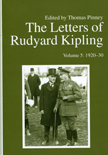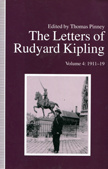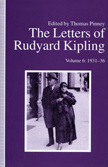The most popular author of his day and a paradox who was both an assertive British imperialist and a man of sensitivity and wide reading, Rudyard Kipling is best remembered now as the author of The Jungle Book, the Just-So Stories, and Kim. He won the Nobel Prize for Literature in 1907—the first Englishman to receive this prize.
Fully annotated, volume 5 covers Kipling’s renewed energy after the stress of world war and the tragedy of his only son’s death at the Battle of Loos in 1915. During these years he traveled extensively (France, Germany, Scotland, Spain, Belgium, Italy, Egypt, Jamaica, Bermuda, and Brazil), received three honorary degrees (from the University of Edinburgh, the Sorbonne, and the University of Strasbourg), published six books (Letters of Travel, The Irish Guards in the Great War, Land and Sea Tales, Debits and Credits, A Book of Words, and Thy Servant a Dog), suffered three serious illnesses, and began the deliberate distribution of his manuscripts. In private life, the greatest change came with the marriage of his surviving child, Elsie. This volume contains a chronology of Kipling’s life from 1920-30.
Praise for the Previous Volumes
“The letters confirm Kipling's brilliance as an observer and chronicler of his time. His lucid style makes reading a joy.”—Choice
“Pinney's exemplary editing, his prodigious learning, never flaunted, embraces every source. His selection is judicious.”—London Review of Books
“Thomas Pinney's editing is informative, concise, always relevant.”—Financial Times
“These evocative, detailed, and entertaining letters are full of Kipling's marvelous descriptive power that vividly captures the era in which he lived. These letters will be of extreme interest to all those fascinated by Kipling's development as both a writer and a cultural critic.”—New York Review of Books
“. . . the whole correspondence is as compulsive to read through . . . as any of [Kipling's] stories.”—Times Literary Supplement
“Kipling is well served by his editor, Thomas Pinney. Pinney is discreet, methodical and judicious. His notes are brief and to the point, his selection of letters is wide-ranging and presented to form a coherent narrative.”—Times Literary Supplement


